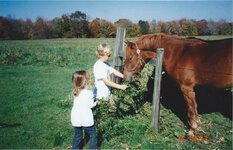I grew up on a farm (horse farm by that time) and my grandparents on both sides had farms. Dairy on my mother's side, beef on my father's side. I live within a mile of 5 different dairy farms. I live and have lived most of my life in a rural community. I grew up baling hay, shoveling manure, feeding animals, and splitting firewood. My wife and I conider our home a homestead, raise chickens, have an orchard and a massive garden. I've milked a cow before. I'm not some city slicker who has never seen a plow in real life.
Me circa 1996/1997 :
View attachment 521267
View attachment 521270
I'm not talking about local, small-time farmers with 50, 100, 200, or even 500 acres. I'm talking about large monocropped fields that are thousands of acres in size. According to the USDA less than half of the farmland in the U.S. is owned by small family farms. I know that A LOT of farmers do care about the land, being a steward of the land, etc. many of them do the best they can using less detrimental practices. They also face considerable financial pressure to keep their farms productive and that usually means making concessions when it gets to a larger scale of agriculture.
You're speaking my language when you talk about no-till, regenerative agriculture, crop rotations, cover crops, permaculture, etc. I love all of that. I also love buying food local. Conventional factory farm agriculture however, isn't all about that. Only about a third of cropland in the U.S. is no-tilled. Most of cropland is still sprayed with chemical fertilizers, herbicides, pesticides, etc. It's just not competitive on a commercial market to raise crops without the use of these things. This isn't an anti-farmer point, its a "the food system is broken and most farmers are victims" kind of point.
I am very pro-farmer, particularly local, small, family-owned farms. However, I'm not going to pretend that the things I mentioned don't exist and aren't very real problems across big swathes of the country. Part of the issue is that larger farms buy up and conglomerate smaller farms who cannot compete with them, particularly without the use of herbicides, pesticides, etc.


